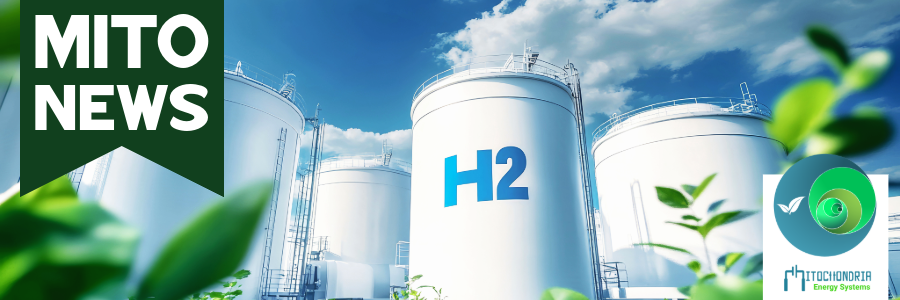
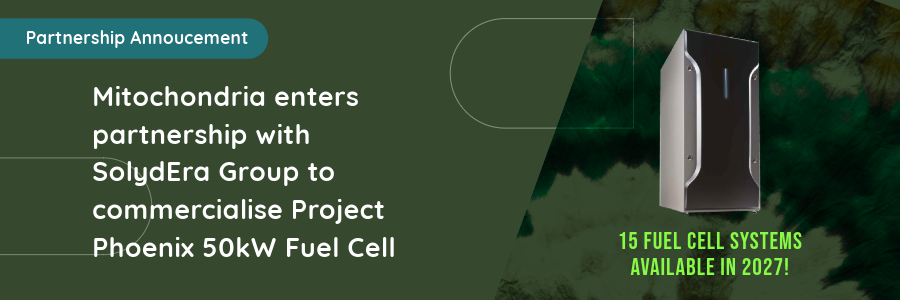
In a move that will modernize South Africa’s energy sector and unlock significant economic benefits for South Africa, Mitochondria Energy has entered into an agreement with leading global stack manufacturer, SolydEra to commercialise its 50kW Fuel Cell System. The agreement between SolydEra and Mitochondria commences in December 2024. This agreement comes at a critical time as South Africa and the African continent face the challenge to develop its energy infrastructure sustainably in line with the United Nations Sustainable Development Goals (SDGs) This partnership will be executed in three Phases. In Phase two, SolydEra working alongside Mitochondria’s engineers, will develop the first Fuel Cell System in Italy, that will be deployed at a customer in South Africa. Phase two will see parts of the Fuel Cell value chain localized in South Africa. In Phase 3 the full fuel cell system will be assembled at The Mitochondria Campus, Mitochondria’s assembly plant located in the Vaal Special Economic Zone. “We are excited to be collaborating with SolydEra, a leader in solid oxide manufacturing with the largest stack production plant in Europe. This partnership support Mitochondria’s strategy to supply the African continents energy needs with our fuel cell product that is clean, efficient, and cost effective,” says Jan van der Merwe, Chief Technology Director of Mitochondria. Mitochondria will install 15 50kW units in 2027 to organisations who are interested in moving towards utilizing clean energy generation in its operations. To be one of the first to have a Mitochondria Fuel Cell contact us for a discovery meeting: info@mitochondria.co.za.
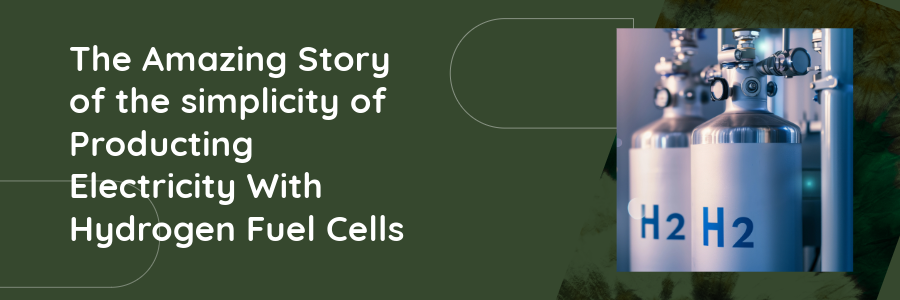
Rooted in the 14-billion-year-old history of the universe is the powerhouse of producing energy from hydrogen. A revolution in the energy generation sector is quietly underway driven by this 14-billion-year-old energy resource using a 200-year-old technology now popularly known as fuel cells. Fuel Cells are an amazing power generation technology that splits the hydrogen atom to produce electricity, heat, and water in an electrochemical modular machine with no moving parts. Mitochondria Energy is introducing an affordable, scalable, and sustainable decentralized and distributed energy into the African energy market. This is our Current Electricity Generation System.
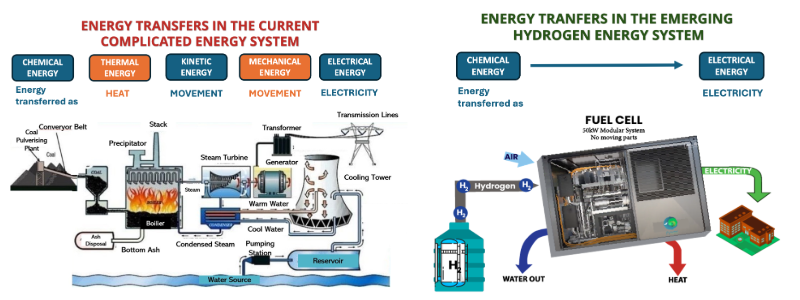
As illustrated in the figure 1, in the current complicated energy system, the process is convoluted. There are five energy transfers and energy is lost at each stage, reducing the efficiency of energy generation to 33%. Infrastructure costs are high, and environmental pollution is severe. When comparing this with the emerging hydrogen energy system, there is one energy transfer from chemical energy into electrical energy resulting in energy efficiencies of up to 60%. This system produces little to no carbon emissions and also produces water, that can be used by the end-user.
The emerging Hydrogen Energy System has the potential to catapult Africans into a new energy future where access to energy security and sustainability becomes accessible to all.
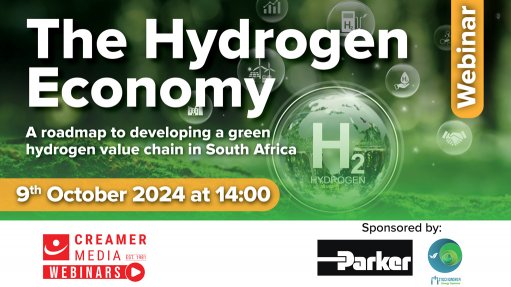
The Development of an integrated hydrogen economy in South Africa has the potential to unlock significant opportunities along the value chain and set the country apart, attendees heard during Creamer Media's Hydrogen Economy webinar on October 9. Referencing a study that found up to 30% of GDP in any economy is accounted for by energy infrastructure and energy provision, hydrogen-based technologies developer Mitochondria Energy Systems CEO & Founder Mashudu Ramano emphasised how fundamental the sector will be to changing the economic fortunes of the region, noting that a lack of energy infrastructure and poor energy systems hamper growth. Hydrogen produces the possibility of not only eliminating energy poverty in Africa but also industrialising, and reducing the need for South Africa to be a consumer of other countries’ productive capability. Read the full article here or watch the webinar online:
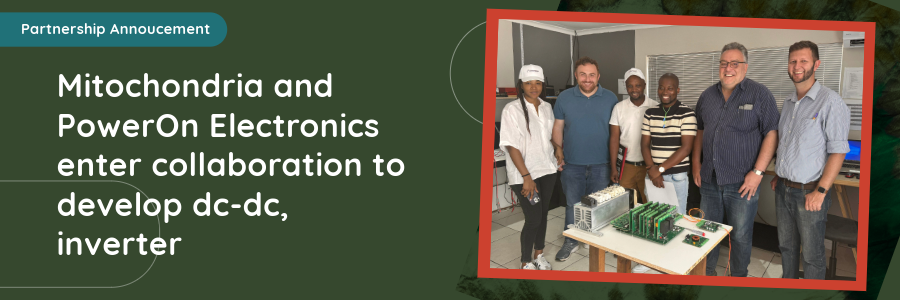
In 2022, Mitochondria conducted an extensive Localisation Study to understand which components that comprise its 50KW Fuel Cell can be procured and manufactured locally in South Africa. Mitochondria’s partnership with PowerOn Electronics is the first development in the effort to localise the Hydrogen Value Chain. PowerOn Electronics was established in 2019 by Andries Putter, who has more than 35 years’ experience in power electronics and electronics design. PowerOn creates custom designs for their clients including the electronics and embedded hardware and software that goes with power electronics. Under the agreement, PowerOn will design and develop a dc-dc converter and an inverter for Mitochondria’s hydrogen technologies. The inverter will be manufactured by Mitochondria at The Mitochondria Campus located in the Vaal Special Economic Zone, Gauteng. Lesetja Matlatle, Electrical Engineer at Mitochondria, will work closely with Andries to design and develop these products. This will ensure that Mitochondria captures the necessary skills to capacitate the future workforce. "Contributing to the development of green technology is inspiring, especially with the growing global need for alternative energy sources. Working with Mr Andries Putter is a life changing opportunity to grow my skills and enable Mitochondria to develop the local hydrogen value chain,” said Lesetja.
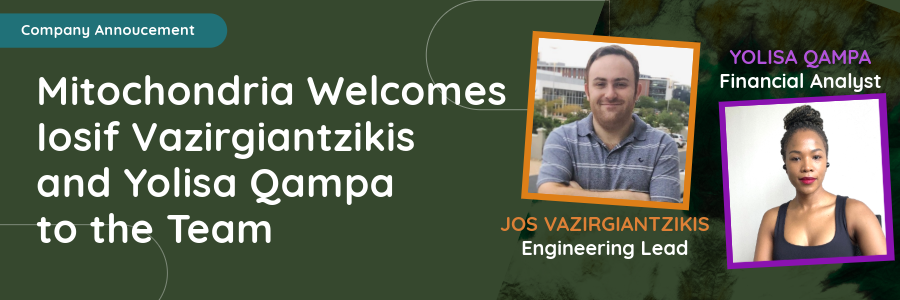
With over a decade of experience in the Fuel Cell sector, Jos Vazirgiantzikis joins the Engineering Team. Jos is a materials engineer with around nine years of experience working on PEM Fuel Cells. From 2022, he was the Senior Scientist in Mintek’s Minerals Fuel Cell Manufacturing team, focusing on scaling up production processes to pilot scale, reflecting his passion for advancing sustainable energy solutions through innovative research. Prior to that from 2020-2022, he worked as a Catalyst Layer Scientist at Johnson Matthey Fuel Cells, a leading manufacturer of catalysts and fuel cells. Jos holds a PhD in Materials Engineering from the University of Cape Town in 2019, an Honours Degree in Material Science in 2014, and a Bachelor in Chemistry and Polymer Science from Stellenbosch University in 2013. Joining the Financial Team, Yolisa Qampa, is an energy and Africa electrification and sustainability enthusiast, driven by a vision to see African Solutions for African Energy Transition problems. She has over a decade of experience working in finance departments. Yolisa is the chairperson of an Audit and Risk Committee for a woman-owned and operated corporate financial Institution (CFI) which is regulated by the Prudential Authority under the South African Reserve Bank and currently transitioning into a mutual bank. She is also a member of the Golden Key International Honor Society. She is currently completing her Masters in Management: Energy Leadership at Witwatersrand University. She holds a Post Graduate Diploma in Business Administration and a Bachelor of Accounting Science Degree.

